
Project 13-08-06040
INFORMATION
SPONSORS

RUSSIA SIBERIA
SECTION
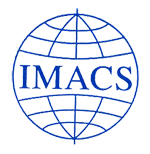
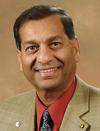 |
Prof. Suresh P. Sethi (University of Texas at Dallas, USA) "MANAGING WITH INCOMPLETE INVENTORY INFORMATION"
|
Abstract: A critical assumption in the vast literature on inventory management has been that the current level of inventory is known to the decision maker. Some of the most celebrated results such as the optimality of base-stock policies have been obtained under this assumption. Yet it is often the case in practice that the decision makers have incomplete or partial information about their inventory levels. The reasons for this are many: Inventory records or cash register information differ from actual inventory because of a variety of factors including transaction errors, theft, spoilage, misplacement, unobserved lost demands, and information delays. As a result, what are usually observed are some events or surrogate measures, called signals, related to the inventory level. These relationships can provide the distribution of current inventory levels. Therefore, the system state in the inventory control problems is not the current inventory level, but rather its distribution given the observed signals. Thus, the analysis for finding optimal production or ordering policies takes place generally in the space of probability distributions. The purpose of this talk is to review recent developments in the analysis of inventory management problems with incomplete information.
 |
Prof. Erwin Pesch (University of Siegen, Germany) "PLANNING AND SCHEDULING IN INTERMODAL TRANSPORT"
|
Abstract: Attracting a higher share of freight traffic on rail requires freight handling in railway yards that is more efficient, and which includes technical innovations as well as the development of suitable optimization approaches and decision-support systems. In this talk we will review planning and scheduling problems of container processing in railway yards, and analyzes basic decision problems and solution approaches for the two most important yard types: conventional railroad and modern railrail transshipment yards. Furthermore, we review some of the relevant literature and identify open research challenges. Additionally we address a scheduling problem that arises in intermodal container transportation, where containers need to be transported between customers (shippers or receivers) and container terminals (rail or maritime) and vice versa. The solution method can be applied to other problems as well.
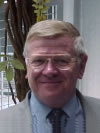 |
Prof. Jean-Marie Proth (INRIA, France) "ASSEMBLY LINE BALANCING: CONVENTIONAL METHODS AND EXTENSIONS"
|
Abstract: Assembly line balancing is the process of assigning operations to workstations along an assembly line so as to satisfy a partial order between operations. The objective is not unique. Among the objectives usually displayed, we distinguish two: minimize the number of stations or minimize, over all stations, the period during which stations are inactive. Even in its simplest form, the problem to be solved is NP-hard. Users of assembly line balancing processes observed that some constraints that apply in real world balancing problems were not taken into account in the OR literature. First there is the fact that we do not rebuild a new assembly line every time a balancing problem arises. Clearly, we can not ignore the previously active line. The second problem is the inability to take into account certain constraints that depend on the assembly process under consideration, such as the need not to physically move certain operations attached to the physical characteristics of a station, or the need to locate several operations in a given area for reasons of multiple operators. In this presentation we first recall the classical models mentioned in the OR literature, as well as the algorithms available to provide a solution close to the optimum. We then introduce some extensions of previous algorithms, for example, the multi-product case and the case where the operating times are stochastic. We further propose two models particularly ingenious: the bucket-brigade model and the U-shaped model. Finally, we give a list of problems that currently remain without solution. It is in this area that could focus a part of future research.
 |
Prof. Andrew Yeh-Ching Nee (National University of Singapore, Singapore) "VIRTUAL AND AUGMENTED REALITY APPLICATIONS IN MANUFACTURING"
|
Abstract: Virtual reality has been used successfully to simulate engineering and manufacturing operations for a number of years. Augmented reality is a natural progression from virtual reality and its ability to superimpose graphics, text, video and audio information on a real scene has made AR more intuitive than VR. This presentation first introduces the background of manufacturing simulation applications and the initial AR developments, followed by the current hardware and software tools associated with AR. Various studies of design and manufacturing activities, such as AR-assisted collaborative design, robot path planning, plant and facility layout, equipment maintenance, CNC simulation, and assembly operations using AR tools have been developed to assist manufacturing operations. Although AR technologies have been applied successfully, there are challenges such as human factors and interactions in AR systems as well as future trends and developments which will need to be addressed.
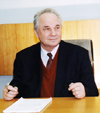 |
Prof. Stanislav V. Emelyanov (Institute for Systems Analysis of the Russian Academy of Sciences, Russia)
"THE CONTROL UNDER UNCERTAINTY CONDITIONS: HISTORY AND PERSPECTIVE"
|
Abstract: Within a problem of control of dynamic plants under uncertainty, both classical methods of the theory of systems with variable structure, and their modern development in the form of the theory of new types of feedback are considered. The exact structure of feedback in control variable structure systems is clarified. Existence of two types of feedback is revealed: one classical feedback by the general regulation error, and another, new type, the coordinate-to-operational feedback. Thus, feedback is responsible for a set of positive dynamical properties for control variable structure systems. Also, the perspective directions of further development of the theory of new types of feedback are considered. In particular, methods of simultaneous control by families of dynamic plants are considered.
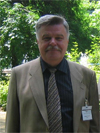 |
Prof. Gennady A. Leonov (Saint-Petersburg State University, Russia)
"NONLINEAR PROBLEMS IN CONTROL OF MANUFACTURING SYSTEMS"
|
Abstract:
This talk addresses the problem of tracking the uncertain demand in case of uncertain production speeds.
The uncertainties are described by deterministic inequalities and the performance is analyzed in the from of worst-case scenarios.
First, a manufacturing process is modeled as an integrator with saturated input. Since the cumulative demand (the reference signal to track) is a growing function of time,
it is natural to consider control policies that involve integration of the mismatch between the current output and current demand.
In the simplest setting it results in models similar to a double integrator closed by saturated linear feedback with an extra input modeling disturbances of different nature.
This model is analyzed and particular attention is paid to the integrator windup phenomenon: lack of global stability of the system solutions that correspond
to the same input signal. The next part of the talk deals with a similar control problem in discrete-time under the surplus-based policy: each machine
in the production network tracks the demand trying to keep the downstream buffer at some specified safe level. The performance of manufacturing networks
with different topologies is analyzed via the second Lyapunov method, while the disturbances are modeled as deterministic inequalities.
The nature of the approach leads to performance analysis in the form of worst case scenarios and allows to find a trade-off between the inventory
level and demand tracking accuracy. The third part of the talk illustrates how to make the theoretical findings operational with the experimental
setup called Liquitrol. The experimental setup consists of a number of water tanks and pumps that can be interconnected via flexible piping.
Each tank represents a buffer with the water playing a role of products. Each pump emulates a manufacturing machine and via piping
it is possible to emulate different topologies of the manufacturing network. Due to its flexibility and mobility the setup allows not only to verify theoretical results via experiments,
but also can be used in educational process to illustrate different phenomena in tandem and re-entrant manufacturing networks.
This talk was prepared by G.A. Leonov, I. Adan, B.R. Andrievsky,
N.V. Kuznetsov, A.Yu. Pogromsky, and K. Starkov. For more information see FILE.
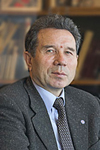 |
Prof. Stanislav N. Vassilyev (V.A. Trapeznikov Institute of Control Sciences, Russia)
"INTELLIGENT CONTROL OF INDUSTRIAL PROCESSES"
|
Abstract: The paper analyzes the problems of intelligent production control subject to world economy trends. It discusses the evolution of the problem of integrated plant floor and plant logistics control and overviews the state-of-the-art control theory methods and the ways to apply them in production control.
  |